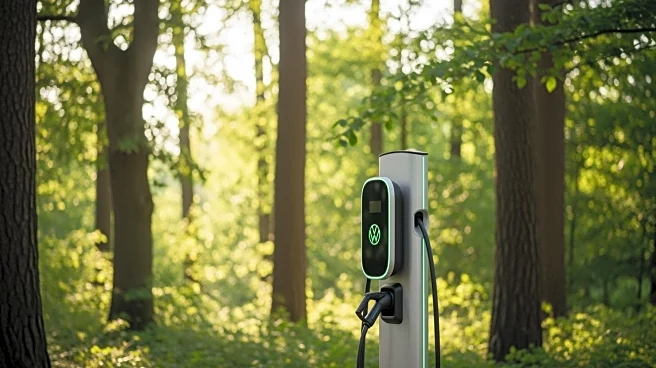What's Happening?
Volkswagen has integrated sustainability into its procurement strategy, emphasizing environmental and human rights standards in supplier selection. The company has formalized this approach through its Raw
Material Due Diligence Management System, which monitors 18 high-risk materials such as lithium, nickel, and cobalt, essential for battery production. Suppliers are required to demonstrate transparency and responsible sourcing practices to secure contracts. Volkswagen's Responsible Raw Materials Policy aligns with international frameworks, promoting upstream due diligence. The company is also advancing battery recycling at its Salzgitter site in Germany to recover critical materials and reduce reliance on virgin inputs, supporting circular supply streams and reducing the carbon footprint of its operations.
Why It's Important?
Volkswagen's procurement strategy is significant as it sets a precedent for sustainability in the automotive industry, potentially influencing other manufacturers to adopt similar practices. By prioritizing environmental and human rights standards, Volkswagen aims to mitigate risks associated with high-risk materials, which are crucial for battery production. This approach not only supports the company's climate commitments but also enhances its reputation as a leader in sustainable manufacturing. Suppliers who fail to meet these standards may lose business opportunities, encouraging industry-wide improvements in environmental practices. The focus on reducing emissions and promoting renewable energy aligns with global efforts to combat climate change.
What's Next?
Volkswagen's procurement teams will continue to track and lower supplier emissions, particularly in energy-intensive materials like steel and aluminum. Suppliers are expected to transition to renewable energy and adopt lower-carbon manufacturing processes. These efforts are part of Volkswagen's broader net-zero trajectory and climate commitments. The company may further expand its recycling initiatives and explore new technologies to enhance sustainability across its operations. Stakeholders, including environmental groups and industry competitors, will likely monitor Volkswagen's progress and potentially adopt similar strategies to remain competitive in the evolving automotive market.
Beyond the Headlines
Volkswagen's strategy highlights the ethical dimension of procurement, emphasizing the importance of human rights and environmental standards in business operations. This approach could lead to long-term shifts in industry norms, where sustainability becomes a key factor in supplier selection. The focus on transparency and responsible sourcing may also drive innovation in material recycling and energy efficiency, contributing to broader environmental goals. As consumers increasingly demand sustainable products, Volkswagen's commitment to these principles may enhance its market position and influence consumer preferences.









